Energy Savings From Occupant Training
September 26, 2014
Today's tip is about how to maximize energy efficiency by doing targeted occupant training.
The following anecdote from Shanti Pless, senior research scientist for the National Renewable Energy Laboratory's (NREL's) Research Support Facility (RSF) in Boulder, Colo., illustrates the importance of continuous occupant training, especially in ultra-energy efficient buildings. (The RSF's 330,000-square-foot facility is the largest net-zero energy building in the world.)
Pless says that the building automation system is designed to send a notification to occupants' computers if the temperature in the building is hot or cold enough that they should close the facility's manually operable windows. He says some occupants thought the pop-up was a notice from IT telling them they needed to close windows on their PC, because they didn't know how the building itself would be telling them to close the actual windows.
While that was an isolated (and fairly amusing) incident, it does emphasize the importance of training. Pless and his team put together an eight-page occupant manual explaining how various aspects of the ultra-efficient building work.
Pless emphasizes, however, that you don't want to put too much faith in occupant training. "You really have to train occupants," he says. "But training is the last line of defense. Training's good, but remember, you'll have to do it continuously forever." Shanti explains that occupants tend to revert back to previous behavior, and so it's up to facility managers to constantly remind them how their actions can affect the building's energy use.
The best-case scenario, says Pless, is if the occupants don't have to do anything out of the ordinary, or anything they'll consider to be a hassle. The best testament to a building is if the occupants talk proudly about being in a net-zero energy building, and how easy it is for them.
Next
Read next on FacilitiesNet







